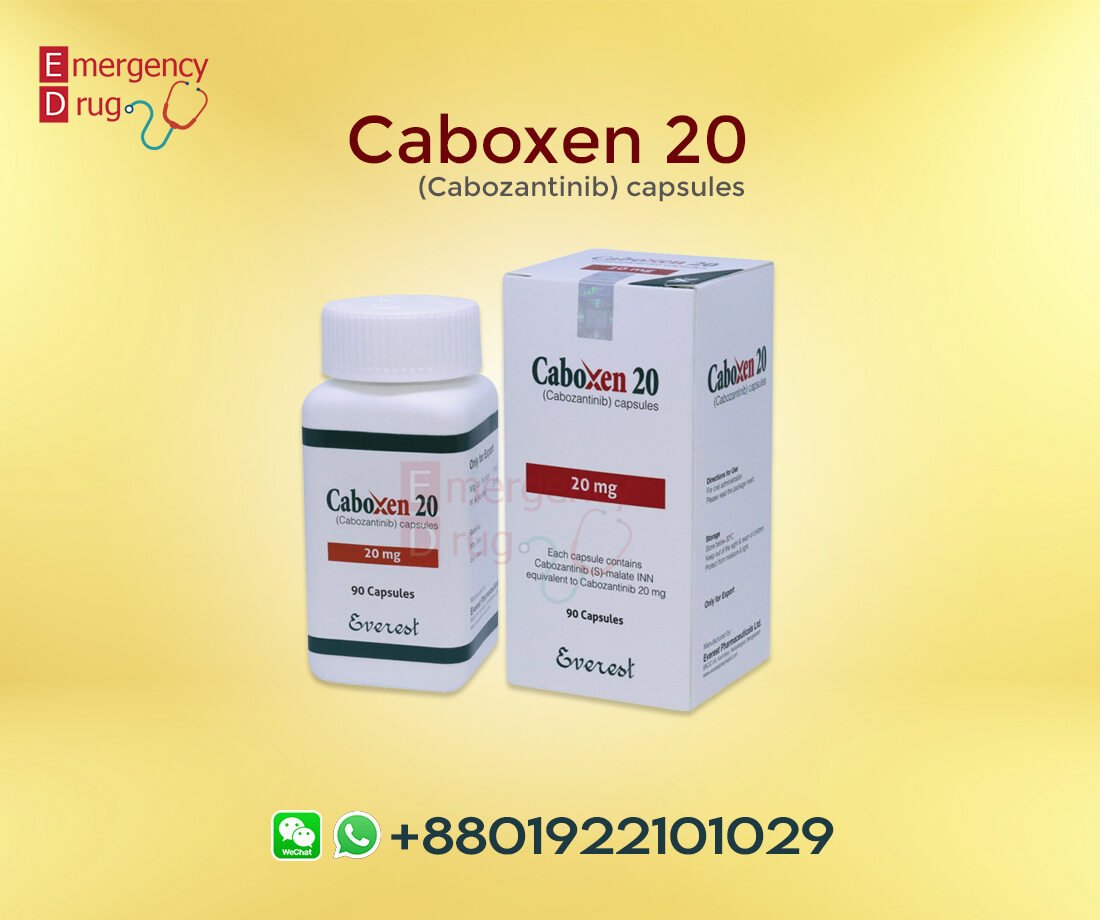Description
Caboxen Tablet 20MG
COMPOSITION
CABOXEN 20 capsule: Each capsule contains Cabozantinib (S)-malate INN equivalent to 20 mg Cabozantinib.
Product Features
| Product Name | : | Caboxen |
| Generic Name | : | Cabozantinib |
| Formulation | : | Capsule |
| Available Pack Size | : | 90’s Pot |
| Available Strength | : | 20 mg |
| Registrations | : | Export Only |
| Manufacturer | : | Everest Pharma Ltd |
Cabozantinib Mechanism of Action
Cabozantinib works by blocking the activity of several proteins called receptor tyrosine kinases. These proteins, including MET, VEGFR-1, VEGFR-2, VEGFR-3, AXL, RET, ROS1, TYRO3, MER, KIT, TRKB, FLT-3, and TIE-2, play roles in various cellular functions and disease processes like cancer growth, spread, blood vessel formation around tumors, resistance to drugs, and maintaining the environment around tumors. Cabozantinib’s action helps in interfering with these processes, which is beneficial in treating certain types of cancer.
Dosage and Administration
The recommended daily dose of Cabozantinib is 140 mg, consisting of one 80-mg capsule and three 20-mg capsules. When taking Caboxen, it’s important to do so on an empty stomach. Also avoid eating for at least 2 hours before and after taking the medication. This helps ensure optimal absorption and effectiveness of the medicine. Treatment should be continued until disease progression or unacceptable side effects occur.
Do not substitute Cabozantinib capsules with tablets and to swallow them whole without opening.
If a dose is missed, it should not be taken within 12 hours of the next scheduled dose.
Patients should also avoid consuming foods or supplements known to inhibit cytochrome P450 while taking Cabozantinib. In cases of hepatic impairment, the starting dose is usually reduced to 80 mg.
Dosage Modifications For Adverse Reactions
Cabozantinib treatment should be withheld for severe adverse reactions, including Grade 4 hematologic adverse reactions, Grade 3 or greater non-hematologic adverse reactions, or intolerable Grade 2 adverse reactions. Upon resolution or improvement of the adverse reaction, the dose should be adjusted as follows:
- If previously receiving a 140 mg daily dose, resume treatment at 100 mg daily (one 80-mg and one 20-mg capsule).
- If previously receiving a 100 mg daily dose, resume treatment at 60 mg daily (three 20-mg capsules).
- If previously receiving a 60 mg daily dose, resume at 60 mg if tolerated; otherwise, discontinue Cabozantinib permanently.
Cabozantinib should be permanently discontinued for the following conditions:
- Development of visceral perforation or fistula formation.
- Severe hemorrhage.
- Serious arterial thromboembolic event (e.g., myocardial infarction, cerebral infarction).
- Nephrotic syndrome.
- Malignant hypertension, hypertensive crisis, persistent uncontrolled hypertension despite optimal medical management.
- Osteonecrosis of the jaw.
- Reversible posterior leukoencephalopathy syndrome.
Dosage Adjustment with CYP3A4 Inhibitors and Inducers:
If patients taking a strong CYP3A4 inhibitor, Cabozantinib dose should be reduced by 40 mg.
If patients taking a strong CYP3A4 inducer, Cabozantinib dose should be increased by 40 mg, as tolerated. For better dose modification consult with your doctor.
Overdose
If you overdose on Caboxen, seek immediate medical attention.
Side Effects of Caboxen 20 MG
Common Side Effects of Cabozantinib
- Diarrhea
- Stomatitis (inflammation of the mouth and lips)
- Palmar-plantar erythrodysesthesia syndrome (PPES) – also known as hand-foot syndrome, causing redness, swelling, and pain on the palms of the hands and/or soles of the feet
- Decreased weight
- Decreased appetite
- Nausea
- Fatigue
- Oral pain
- Hair color changes
- Dysgeusia (changes in taste perception)
- Hypertension (high blood pressure)
- Abdominal pain
- Constipation
Common Laboratory Abnormalities
- Increased AST (aspartate aminotransferase)
- Increased ALT (alanine aminotransferase)
- Lymphopenia (reduced white blood cell count)
- Increased ALP (alkaline phosphatase)
- Hypocalcemia (low calcium levels)
- Neutropenia (reduced neutrophil count)
- Thrombocytopenia (reduced platelet count)
- Hypophosphatemia (low phosphate levels)
- Hyperbilirubinemia (high bilirubin levels)
Grade 3-4 Adverse Reactions
- Diarrhea
- PPES
- Lymphopenia
- Hypocalcemia
- Fatigue
- Hypertension
- Asthenia (weakness)
- Increased ALT
- Decreased weight
- Stomatitis
- Decreased appetite
- Nausea
Warnings and Precautions of Caboxen 20 MG
Perforations and Fistulas
Gastrointestinal (GI) perforations and fistulas occurred in 3% and 1% of patients treated with Cabozantinib, respectively. All instances were serious, with one GI fistula resulting in fatality (< 1%). Non-GI fistulas, including tracheal/esophageal, were reported in 4% of patients treated with Cabozantinib, with two (1%) fatalities. It is crucial to monitor patients for symptoms of perforations and fistulas, including abscesses, and discontinue Cabozantinib for patients experiencing such complications.
Hemorrhage
Serious and occasionally fatal hemorrhages have been associated with Cabozantinib treatment. Grade ≥ 3 hemorrhagic events were more frequent in Cabozantinib-treated patients compared to those receiving placebo (3% vs. 1%). Cabozantinib should not be administered to patients with a recent history of hemorrhage or hemoptysis.
Thrombotic Events
Cabozantinib increases the incidence of thrombotic events, including venous thromboembolism (6% vs. 3%) and arterial thromboembolism (2% vs. 0%) in Cabozantinib-treated patients compared to placebo-treated patients. Discontinue Cabozantinib in patients experiencing acute myocardial infarction or any other clinically significant arterial thromboembolic complications.
Wound Complications
Wound complications have been reported with Cabozantinib use. Treatment with Cabozantinib should be ceased at least 28 days prior to scheduled surgery. Resumption of Cabozantinib therapy after surgery should be based on clinical judgment regarding adequate wound healing. Cabozantinib should be withheld in patients with wound healing complications requiring medical intervention.
Hypertension
Cabozantinib treatment increases the incidence of treatment-emergent hypertension, with 61% of Cabozantinib-treated patients exhibiting stage 1 or 2 hypertension according to the modified Joint National Committee criteria, compared to 30% of placebo-treated patients. Monitor blood pressure before starting Cabozantinib and regularly during treatment. Withhold Cabozantinib for uncontrolled hypertension and discontinue it for severe hypertension that cannot be managed with antihypertensive therapy.
Osteonecrosis of the Jaw
Osteonecrosis of the jaw (ONJ) occurred in 1% of patients treated with Cabozantinib. ONJ can present with various symptoms including jaw pain, osteomyelitis, and tooth or periodontal infections. Discontinue Cabozantinib for osteonecrosis of the jaw (ONJ). Conduct oral examinations prior to initiating Cabozantinib and periodically during therapy, and advise patients on good oral hygiene practices.
Palmar-Plantar Erythrodysesthesia Syndrome
Palmar-plantar erythrodysesthesia syndrome (PPES) occurred in 50% of patients treated with Cabozantinib, with 13% experiencing severe (Grade 3) PPES. Cabozantinib should be withheld in patients with Grade 2 or 3 PPES until improvement to Grade 1, after which it can be resumed at a reduced dose.
Reversible Posterior Leukoencephalopathy Syndrome
Reversible Posterior Leukoencephalopathy Syndrome (RPLS) occurred in one (<1%) patient. Evaluation for RPLS is warranted in patients presenting with seizures, headache, visual disturbances, confusion, or altered mental function. Cabozantinib should be discontinued in patients who develop RPLS.
Embryo-Fetal Toxicity
Cabozantinib can cause fetal harm when administered to pregnant women, as indicated by data from animal studies. Pregnant women should be advised of the potential risk to the fetus.
Use in Specific Populations
Pregnancy
Cabozantinib poses a risk of fetal harm when administered to pregnant women, as evidenced by animal studies. No data is available in pregnant women to quantify the associated risk. Administration of Cabozantinib to pregnant rats and rabbits during organogenesis led to embryo-fetal lethality and structural abnormalities. In addition these effects occurred clinically at the recommended doses. Women of childbearing potential should be informed of the potential hazard to a fetus.
Breastfeeding
No information is available regarding the presence of Cabozantinib or its metabolites in human milk or their effects on the breastfed infant or milk production. Due to the potential for serious adverse reactions in breastfed infants, lactating women should refrain from breastfeeding during Cabozantinib treatment and for 4 months after the final dose.
Contraception for Females and Males of Reproductive Potential
Cabozantinib can cause fetal harm during pregnancy. Females of reproductive potential should use effective contraception not only during Cabozantinib treatment but also for 4 months after the final dose.
Pediatric Use
The safety and efficacy of Cabozantinib in pediatric patients have not been studied.
Geriatric Use
Clinical studies did not include sufficient numbers of patients aged 65 years and older to determine whether they respond differently from younger patients.
Hepatic Impairment
Patients with mild to moderate hepatic impairment exhibit increased exposure to Cabozantinib. Reduce the starting dose in patients with mild (Child-Pugh score A) or moderate (Child-Pugh score B) hepatic impairment. Do not use Cabozantinib in patients with severe hepatic impairment.
Renal Impairment
No dosage adjustment is necessary in patients with mild or moderate renal impairment.
Storage Conditions
Store Cabozantinib 20 mg below 25°C. Keep out of the sight & reach of children. Protect from moisture & light.
How supplied
CABOXEN 20 capsule: Each HDPE container contains 90 capsules each of which contains Cabozantinib 20 mg.
CABOXEN 80 capsule: Each HDPE container contains 30 capsules each of which contains Cabozantinib 80 mg.
Caboxen 20 MG capsule is an alternative medicine to Cometriq, made by Everest Pharmaceuticals Ltd. Caboxen 20mg tablet cost is reasonable.
Countries where our service provided
Delivering worldwide including United State (USA), United Kingdom (UK), Saudi Arabia, Dubai, Kuwait, Qatar, Philippines, Nepal, Malaysia, Indonesia, Thailand, Poland, Peru, South Korea, New Zealand, Netherlands, Georgia, France, Egypt, Australia, Germany, Canada, Uzbekistan, Lebanon, Mexico, Singapore, Vietnam, Pakistan, Russia, Ukraine, Bangladesh, India
Why Buy from Us :
- 100% genuine products
- Licensed exporter
- Discreet packaging
- Customer support
Note: The descriptions provided above are taken from the prescription information for Caboxen (Cabozantinib), as provided by Everest Pharmaceuticals Ltd. Full prescription








Reviews
There are no reviews yet.